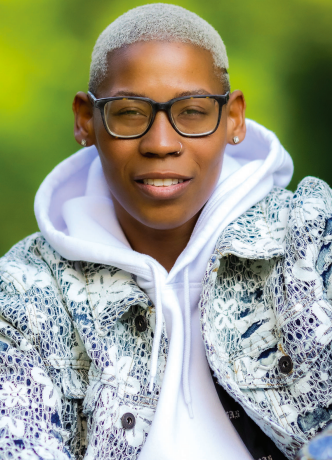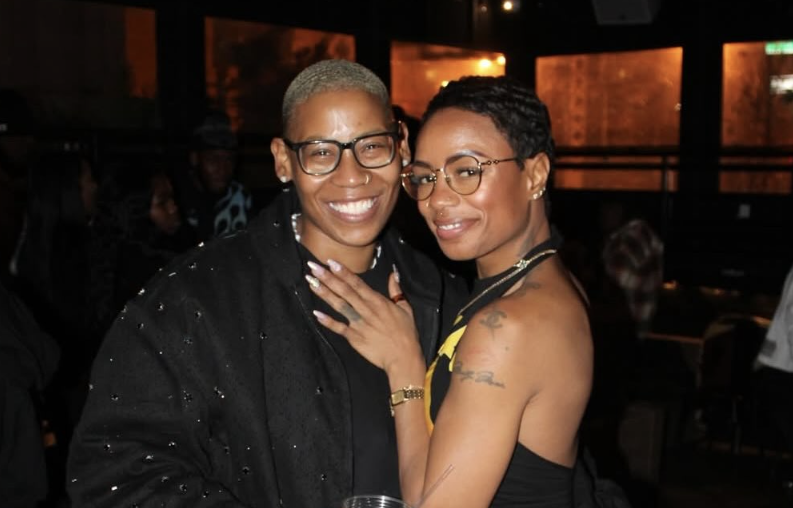GO’s Most-Loved Story of 2023: Instant Parenthood

This high school GSA advisor learned how to deal with parenthood quickly—when a family tragedy left her alone with an infant, a toddler, and an 8-year-old.
Trigger warning: Brief mention of domestic abuse and gun violence.
Like many other single queer women in the Bronx, DaShawn Wilson went out to party most Friday nights. March 11, 2022, should have been no different. Wilson called her sister (a mother of three who lived in Upstate New York) saying she was tired and felt unsure about going out. Her sister told her to stay in and rest, though she herself had planned a grocery store run after they hung up. Wilson took her sister’s advice and fell asleep early.
Frantic calls from her sister’s best friend awoke Wilson around midnight to tell her that her sister had been shot by her longtime boyfriend, the father of their children.
“To get a call at almost midnight that your sister—you don’t know if she’s alive, you don’t know where the kids are, you don’t know anything.” Wilson reflects on what she calls “the most terrifying night” of her life.
This violence is all too common for women in the United States. According to an Everytown research analysis, about 70 women are shot and killed by intimate partners per month, accounting for 80% of domestic gun violence victims in the nation. And nearly three women are killed each day in the U.S. from domestic violence, according to the Violence Policy Center’s annual report, When Men Murder Women.
Wilson also received notification from authorities, informing her that her sister had been shot, and that she needed to travel upstate to take possession of the children. Without a car and during a snowstorm, Wilson and her mother traveled the three hours to the hospital where her sister was— all the while making decisions about emergency surgery for Wilson’s sister, who had been shot three times.
Overnight, Wilson transitioned from being the fun aunt who stopped by on weekends with presents to being a single parent responsible for the livelihoods of a 1-year-old, a 2-year-old, and an 8-year-old. Initially, Wilson says, it was rocky.

“They didn’t sleep,” Wilson says. “They cried all the time.” But after about a month or two, she “couldn’t imagine not having them around.”
Soon, Wilson was developing a deeper relationship with her nieces and nephew. For Wilson, every day moments like taking her nephew to get a haircut or niece to get her hair braided became special ways to bond.
“[Now], I know them on a different level,” Wilson says. “I know their favorites. I know what they like to eat. I know how to make them laugh. I know how to put them to sleep.”
Wilson says the experience “humbled” her, giving her “a new lens of appreciation for what parents do for their kids.”
Wilson’s day began at 5am, when the two babies awoke. She took care of all of their needs, including diaper changes and meal prep, as well as preparing her older niece for online school. She was tasked with “traditional mom roles,” providing as much stability and balance as possible.
Prior to taking the children in, Wilson worked as the associate dean at the New Vision Charter High School of Advanced Math and Sciences II in the South Bronx. As one of the first out, queer people of color working at the school, Wilson says she quickly found students opening up to her about their own identities. In 2017, Wilson even helped form the first Gender and Sexuality Alliance on campus and later taught hip hop lyricism as well. For Wilson’s students, who are predominantly marginalized Black and brown youth, representation is vital for their growth.
“It really matters to see yourself,” Wilson says. “You feel like you’re by yourself, but to see representation and have that moment with someone—if they’re okay living their truth—it inspires you to do the same.”
As a dean, Wilson described her initial approach as being “by the book.” But she admits, “When life happens, and you experience things on a different level—you [learn] compassion matters, empathy matters.”
Instant parenthood was financially stressful for Wilson, who had finally secured her own apartment in one of the country’s costliest cities. After the incident, Wilson had to step away from her work, and was, at one point, dependent on donations from a GoFundMe page.
Wilson’s sister spent months recovering in the hospital, later transitioning to a nursing home for secondary care. While recovering from the attack, her sister was also tasked with finding suitable new housing. Wilson made sure her sister was able to FaceTime with her kids daily. On Mother’s Day last year, a month and a half after the incident, and after her sister had recuperated to an appropraite degree, Wilson was finally able to take the kids to visit their mom in the hospital.
“It was really hard for her to not be with her kids,” Wilson says. “She’s never not been with her kids. She knew that they were safe. [But] it was very difficult for her to have to watch someone else take care of her kids, even if that person was her sister.”
In October, after eight months, the children were finally reunited with their mother and Wilson returned to work, now as the school’s technology coordinator. For the educator and activist, it was a bittersweet moment. There are still times where Wilson feels sad and misses the presence of her nieces and nephew in her home.
Wilson’s sister now uses a wheelchair and is assisted by a home health aide. All are still hopeful that her sister will make a full recovery. The doctors initially said she wouldn’t be able to talk or have movement below her neck, but her sister is now speaking, sitting up, and has some range of motion in both arms, Wilson says.
“She’s living proof that miracles are real.”
Prior to the incident, Wilson and her sister didn’t talk daily. Now, not a day goes by without the two speaking. Wilson feels a deeper respect for her sister, who provided love and care for her children despite living in a toxic and unsafe environment. They are now developing a script to help share their experiences to be a support for others. Production companies have already reached out to the sisters.
“Our next step is to turn our pain into a purpose,” Wilson says. “The goal [is] to save a life or help someone that might have been through a similar situation.”













